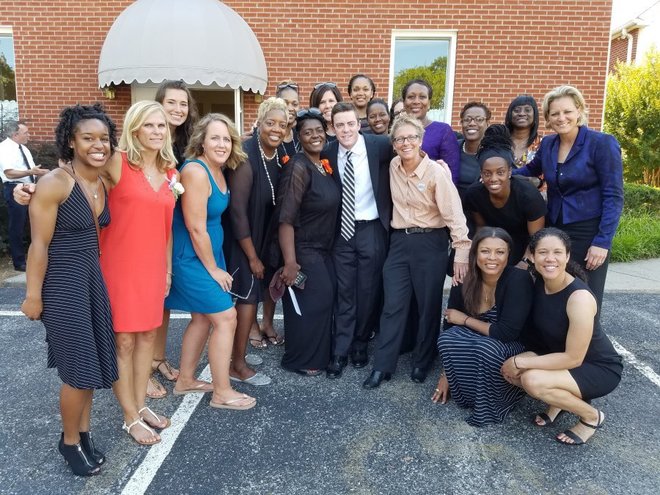Once a year, Seymour United Methodist Church in Tennessee held a "Laity Day," in which folks from the pews would handle all the clergy stuff one Sunday — including the sermon.
The year was 1984, early in the Rev. Charles Maynard's decade at this fledgling congregation near Knoxville. He already knew that one active member had a knack for motivational speaking, since she coached the University of Tennessee's Lady Vols basketball team.
"This was before she turned into Pat Summitt, you know? For me, she was just a lady at church named Pat," said Maynard, now the district superintendent of the region's Maryville District. "I asked her to speak and she said she didn't feel comfortable doing that sort of thing. ...
"But the next year, she said 'yes.' She talked about teamwork and linked everything to people having their own roles in the body of Christ. It was all very biblical and she did a great job. I mean, she's Pat Summitt."
Things started changing after she coached the U.S. team to gold at the 1984 Olympics and the Lady Vols "started winning everything in sight," he said.
One thing didn't change. While Summitt's work demanded lots of time and travel, her family stayed as "active at church as the coach of a national powerhouse could possibly be," said Maynard. "It was pretty obvious that she had been raised in a Methodist church in rural Tennessee. It showed. Her faith went down deep."
Summitt's death at age 64, after a five-year fight with Alzheimer's disease, unleashed a national outpouring of tributes. With her intense, blue-eyed stare, she became an icon of excellence over four decades, eight national NCAA championships and 1,098 wins — the highest Division 1 total for any basketball coach, male or female. Her athletes had a 100 percent graduation rate.
Then came the devastating 2011 diagnosis from the Mayo Clinic. Months later, in a dialogue included in "Sum It Up," her autobiography cowritten with Washington Post columnist Sally Jenkins, Summitt was blunt.
"Sometimes I wish God hadn't given me so many issues," she said.
Jenkins replied: "What kind of issues?"
"Personal issues," said Summitt. "I guess they made me who I am. I guess they made me better. One thing I've learned. ... How powerful God is."
Later in the book, Summitt said she realized that "none of us have a perfect life here on earth. ... We're not here to be completely satisfied. Nor are we in command — not even of our own bodies. We borrow, we don't own. I know that everything I've been given came as gifts from God, and He has a way of reminding us, 'This is my work.'"
Behind the scenes, Summitt endured six miscarriages before the birth of her son, Tyler, and faced divorce after 27 years of marriage. Her body was ravaged by rheumatoid arthritis. Then came Alzheimer's disease.
As a sign of their unity, Summitt and Tyler — active in Knoxville's giant Faith Promise Church — were baptized together in May 2012 to "go public with their faith," according to the Pat Summitt Foundation obituary.
Tyler added: "For 64 years, my mother first built her life upon a strong relationship with her Lord and Savior, Jesus Christ. Her foundation was also built upon love of her family and of her players, and love of the fundamentals of hard work, which reflected her philosophy that 'you win in life with people.'"
Anyone who worshipped and prayed with her knew that, said Maynard, who baptized Tyler as a baby. Summitt knew who she was, he said.
In another book with Jenkins, there's a scene in which the undefeated 1998 Lady Vols team, shortly before winning the championship, began singing the Gospel classic "Love Lifted Me" in the dark on their bus:
"I was sinking deep in sin, far from the peaceful shore. Very deeply stained within, sinking to rise no more. When the master of the sea heard my despairing cry, from the waters he lifted me. Now safe am I. Love lifted me."
"Pat wouldn't have broken out singing that hymn on her own, but she would have joyfully joined in and encouraged it," said Maynard. "She wouldn't have forced anything, but she would have embraced it.
"She was a doer of the faith, not a talker. But she wasn't hiding."
Terry Mattingly is the editor of GetReligion.org and Senior Fellow for Media and Religion at The King's College in New York City. He lives in Oak Ridge, Tenn.


